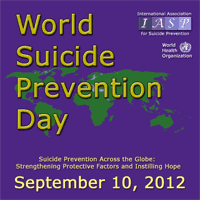 In the Eastern Mediterranean Region, suicide accounts for an estimated 36 000 deaths annually“Light a candle near a window”, is the call made by the International Association for Suicide Prevention, in collaboration with WHO, on the occasion of World Suicide Prevention Day 2012. It is intended as a message of hope and understanding for those who attempt to end their lives due to feelings of despair and lack of hope.
In the Eastern Mediterranean Region, suicide accounts for an estimated 36 000 deaths annually“Light a candle near a window”, is the call made by the International Association for Suicide Prevention, in collaboration with WHO, on the occasion of World Suicide Prevention Day 2012. It is intended as a message of hope and understanding for those who attempt to end their lives due to feelings of despair and lack of hope.
The theme of World Suicide Prevention Day this year is "Suicide prevention across the globe: strengthening protective factors and instilling hope". The aim of the Day, which is celebrated annually on 10 September, is to raise awareness among the scientific community and the general population that suicide is preventable.
Suicide is a significant public health problem. Every year, almost one million people die by suicide around the world. In the Eastern Mediterranean Region, suicide accounts for an estimated 36 000 deaths annually.
Worldwide, suicide is one of the three leading causes of death among those in the most economically productive age group (15–44 years), and the second leading cause of death in the 15–19 years age group.
Older people are also at high risk in many countries. Data from the Global School Health Survey carried out in Member States of the Region indicate high rates of suicidal ideations and behaviours. Studies showed variations in lifetime suicide ideation between 2.09% and 14.1%, and for suicide plans between 1.36% and 9.8%.
The annualized suicide rates from Member States vary between 0.43 and 20.3 per 100 000 populations. The most commonly observed associations between suicide and sociodemographic variables are: male gender, single, between 20 and 40 years, manual workers and the unemployed.
Only six Member States have ever reported national suicide rates to WHO and the rates that are officially reported are extremely low compared to global rates. This can partly be explained by religious and sociocultural taboos around suicide and also by weak civil registration and health information systems in countries. The result is a lack of accurate information as to the extent of the problem, the methods used for attempted and completed suicide and the groups particularly at risk for attempted and completed suicides.
Within this context, the Regional Office, in coordination with WHO headquarters, has developed a recording and reporting system on suicide and suicide attempts for use by countries. Dr Ala Alwan, WHO Regional Director for the Eastern Mediterranean noted, “This system will provide us with more accurate information, not only about the extent of the problem, but also about the methods used, and those groups that are particularly vulnerable. This, in turn, will pave the way to establish appropriately targeted prevention and care programmes. It is clear that suicide prevention calls for innovative, comprehensive multisectoral action, including both the health sector and non-health sectors, such as education, labour, the police, the judiciary, religion, law, politics and the media.”
To rekindle hope and protect the vulnerable it is now time to implement evidence-based cost-effective strategies and interventions.


